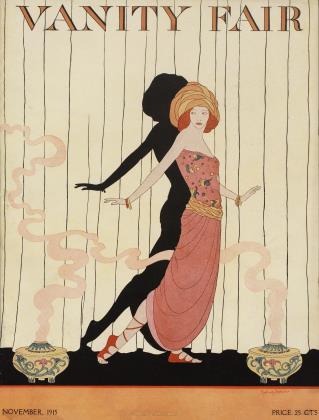Sign In to Your Account
Subscribers have complete access to the archive.
Sign In Not a Subscriber?Join NowS. O. S—R. S. V. P.
Vanity Fair's Award of Etiquette Prizes
Charles Macomb Flandrau
"GRAYNESS moved across Captain A's face as he stood before an Admiral of the British Navy.
"'My wife is innocent; I am the traitor!' he mumbled. His words grated much as worlds must have done when God first loosed them. His easy erectness stiffened, and death caught him as he fell."
No, every one of you has guessed wrong. This solution of Captain A's problem (in the S. O. S. department of Vanity Fair—it was in the September issue) was not submitted by Marie Corelli, Harold Bell Wright, or Robert W. Chambers, and as it did not obtain a prize, I am unfortunately not at liberty to disclose the name of the writer. Personally, my desire to award her—the writer of this gem—the first prize, was very great, as I have always had a weakness for "style" in literature, and in this little communication there is an unusual amount of style to the square word. However, the four other judges out-voted me. (Between me and the Public, I do not trust those other four judges; they are agreeable companions, but I have long suspected their honesty.) The etiquette problem to be solved was briefly, as follows: Captain A of the British Navy, who has been stationed abroad, has fallen in love and married a fascinating foreigner. They have one child—another is expected. One day the Captain discovers that in the sanctity of their domestic life his wife has been obtaining naval secrets from him, and transmitting them to the government of the country from which she originally came. In other words, she is a spy. Problem: What should Captain A now do?
This heartrending problem, it is interesting to note, elicited a whole avalanche of replies from our northern neighbor, and while every Canadian chivalrously and tenderly provided for Mrs. A, the child, and the child unborn, country and duty came first. In view of this, the judges greatly regret that Canada did not carry off the first prize which is given to Clara H. Berry of Anoka, Minnesota. Miss Berry has the Canadian spirit, but in addition, she also has the gift of terse and forcible expression.
"Captain A was an officer before he was a husband. Let him face his wife with the charges, and if she will not promise to desist, he must threaten her with exposure, and do whatever is required of him as a patriot. Duty comes first in life; love, second."
It is a grim doctrine, Miss Berry, but, (anyhow theoretically) we are with you.
THE second prize is awarded to W. J. Lampton of 109 West 54th Street, New York, who wrote an acutely psychological little essay that kept the judges (Oh, those judges!) squabbling for several hours. In part, he observed as follows: "What is Captain A to do? His is a reality which knocks out all theories. Everybody knows what he should do. If Captain A is something more than human (inhuman, let us say) he will let his patriotism master his love of wife and child; otherwise not. Some men are infatuated lovers, and some are infatuated patriots. Infatuation is irresistible. It is up to Captain A's infatuation, not his calm judgment."
Vanity Fair is deeply grateful to Miss Berry and to Mr. Lampton for having dared to step in where Wilsons and Bryans fear to tread.
 View Full Issue
View Full Issue












Subscribers have complete access to the archive.
Sign In Not a Subscriber?Join Now